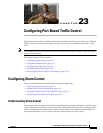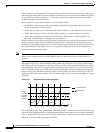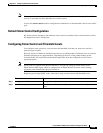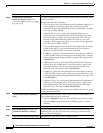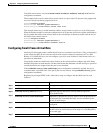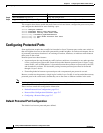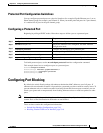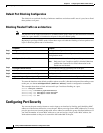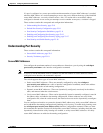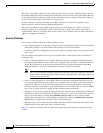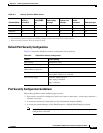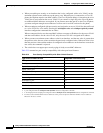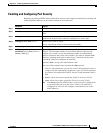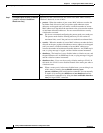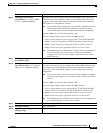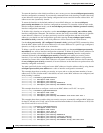
23-9
Catalyst 2960 and 2960-S Switch Software Configuration Guide
OL-8603-09
Chapter 23 Configuring Port-Based Traffic Control
Configuring Port Security
If a port is configured as a secure port and the maximum number of secure MAC addresses is reached,
when the MAC address of a station attempting to access the port is different from any of the identified
secure MAC addresses, a security violation occurs. Also, if a station with a secure MAC address
configured or learned on one secure port attempts to access another secure port, a violation is flagged.
These sections contain this conceptual and configuration information:
• Understanding Port Security, page 23-9
• Default Port Security Configuration, page 23-11
• Port Security Configuration Guidelines, page 23-11
• Enabling and Configuring Port Security, page 23-13
• Enabling and Configuring Port Security Aging, page 23-17
• Port Security and Switch Stacks, page 23-18
Understanding Port Security
These sections contain this conceptual information:
• Secure MAC Addresses, page 23-9
• Security Violations, page 23-10
Secure MAC Addresses
You configure the maximum number of secure addresses allowed on a port by using the switchport
port-security maximum value interface configuration command.
Note If you try to set the maximum value to a number less than the number of secure addresses already
configured on an interface, the command is rejected.
The switch supports these types of secure MAC addresses:
• Static secure MAC addresses—These are manually configured by using the switchport
port-security mac-address mac-address interface configuration command, stored in the address
table, and added to the switch running configuration.
• Dynamic secure MAC addresses—These are dynamically configured, stored only in the address
table, and removed when the switch restarts.
• Sticky secure MAC addresses—These can be dynamically learned or manually configured, stored in
the address table, and added to the running configuration. If these addresses are saved in the
configuration file, when the switch restarts, the interface does not need to dynamically reconfigure
them.
You can configure an interface to convert the dynamic MAC addresses to sticky secure MAC addresses
and to add them to the running configuration by enabling sticky learning. To enable sticky learning, enter
the switchport port-security mac-address sticky interface configuration command. When you enter
this command, the interface converts all the dynamic secure MAC addresses, including those that were
dynamically learned before sticky learning was enabled, to sticky secure MAC addresses. All sticky
secure MAC addresses are added to the running configuration.



